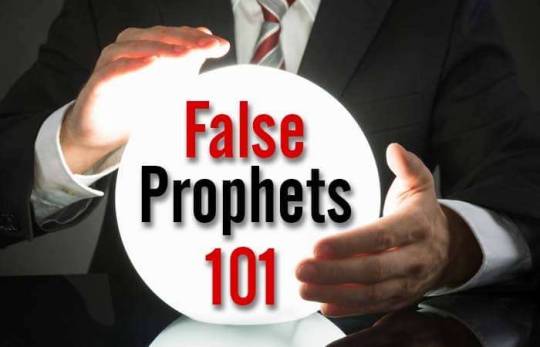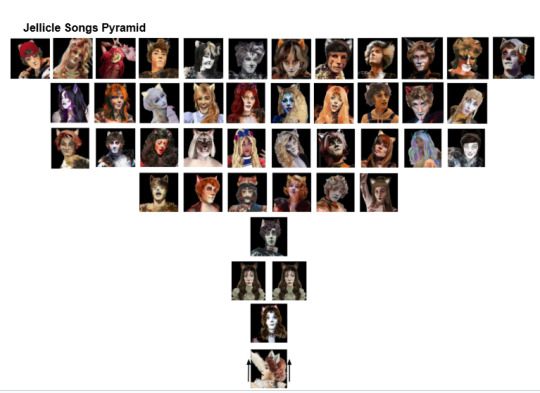#Deut.13
Explore tagged Tumblr posts
Text
The Deuteronomy 13 Test for a False Prophet

The Deuteronomy 13 Test for a False Prophet This post may contain affiliate links. As an Amazon Associate, I may earn a commission on sales. Have you ever pondered why the Jewish people fail to grasp the profound truth that Jesus, also known as Yeshua in Hebrew, is the long-awaited Messiah prophesied by the ancient Prophets? It appears incredibly straightforward to us. We often believe that if we simply introduce them to the New Testament, they will instantly comprehend its meaning. If they refuse it, the fault lies within them. However, should we not question our own role in this? What responsibility do we bear in the matter? If you are truly committed to your mission of evangelization, then prepare yourself for the ultimate challenge: Can you effectively demonstrate to someone of Jewish faith that Yeshua is the long-awaited Messiah? Paul's daily routine in the synagogues, as portrayed in the Book of Acts, was dedicated to spreading the truth. Countless Jews were enlightened, recognizing Yeshua as the long-awaited Messiah who selflessly atoned for our sins.
But, that is not happening so much today.
Why? It's confusing to us that Jews today have no greater understanding of the Scriptures than their ancestors did in the first century. How would you approach a conversation with someone who is Jewish? Can you effectively persuade them that Yeshua is indeed the long-awaited Messiah? Is there any reason why they might have reservations about Yeshua? During the initial fourteen years following the crucifixion, an immense number of Jews, consisting of thousands upon thousands, eagerly sought knowledge about the first arrival of their Messiah and His true identity. At that time, the focus was primarily on the Jews, with the Gentiles not yet playing a significant role. The Book of Acts provides detailed accounts of this historical reality, which is widely acknowledged and accepted. Why haven't thousands, if not tens of thousands of Jews embraced their Jewish Messiah Yeshua as they did in the first century? What altered the course of events? What caused this to cease? Are many teaching something different from what our Messiah truly taught? Are many teaching something different from what the Apostles taught? Are many teaching something different from what Paul taught? These men managed to introduce the Messiah to a multitude of Jews. What could possibly be the obstacle today? What exactly is our dilemma? There are various issues that need to be addressed, but they are not insurmountable. It is possible that these problems stem from a misinterpretation of prophecy or an excessive attachment to traditions that contradict the teachings of God's Word. This can lead to a state of blindness, as highlighted in Mark 7:13. When one's own doctrine is contrary to the Word of God, it can be challenging to perceive Yeshua as the embodiment of God's message (John 1:14; Rev. 19:13). These difficulties are particularly relevant for certain individuals within the Jewish community. While overcoming these challenges may require a considerable amount of time and patience, they are by no means insurmountable. Paul experienced both success and failure throughout his journeys. Although it is true that some of the Jews were separated from the Tree, as mentioned in Romans 11, it is important to acknowledge that many of them truly embraced the message of Yeshua. This transformation was made possible through the teachings of the Apostles, especially Paul. Let's explore the primary obstacle that often prevents Jews from embracing Yeshua (Jesus) as the long-awaited Messiah. During the first century, Paul frequently engaged in teaching the Word of God and spreading the teachings of Messiah in various synagogues. “Immediately he preached the Christ in the synagogues, that He is the Son of God” (Acts 9:20). “Therefore he reasoned in the synagogue with the Jews and with the Gentile worshipers, and in the marketplace daily with those who happened to be there” (Acts 17:17). “And he came to Ephesus, and left them there; but he himself entered the synagogue and reasoned with the Jews” (Acts 17:17). “And he went into the synagogue and spoke boldly for three months, reasoning and persuading concerning the things of the kingdom of God” (Acts 19:8). To have impactful discussions with Jews, a deep understanding of prophecy and Yeshua's Gospel accounts is essential. Although challenging, Paul's efforts with the Jews proved fruitful on certain occasions. Additionally, as previously stated, Jewish leadership frequently opposed Paul, just as they did with Yeshua. Paul, similarly to Yeshua, posed a grave threat to the established religious system based on traditions and doctrines, which Yeshua condemned as a manifestation of lawlessness. Paul, like Yeshua in Mark 7, John 7:19, and Matthew 23, fervently denounced the traditions and doctrines that contradicted the teachings of Moses. Yeshua's message can be summarized as recognizing the goodness of what Moses wrote, while criticizing the Jewish leadership for their misguided traditions and doctrines that contradicted Moses. A significant number of Jews turned away from the misleading religious practices and traditions that arose from this theological evolution. Instead, they chose to devote themselves exclusively to the Word of God and Yeshua. As a result, the Jewish leadership grew increasingly anxious. Their nerves were rattled by the emerging threat to their power and influence. To clarify, Yeshua and His followers did not oppose the teachings of Moses. Instead, they opposed the Oral Law or the "commandments of men", as they were known among the Jews of that day. Today, the ancient compilation of Jewish oral law is widely known and recognized as the Talmud. This sacred text encompasses the expansive wisdom that was meticulously transcribed and enriched with additional insights, thus augmenting the divine Law revealed to the Jewish people. They constructed barriers surrounding the Word of God, imposing their own intricate commandments dictating how God's people should follow His Commandments. They excessively restricted the guidelines and even created new ones. It's ironic that the same thing has happened within traditional Christianity. The construction of formidable barriers around God's Word had the unfortunate consequence of obscuring the essence of the Word itself within their teachings and behavior. Consequently, God's Word became veiled and, as Yeshua declared, rendered ineffective. A false religion was constructed, distorting the true essence of God's Word. Man-made commandments transformed God's Law into a heavy burden, to the point where it ceased to be divine and instead became a complex framework built upon God's Law.
On the Sabbath, our Creator commanded us to rest. However, the "oral law" developed numerous guidelines to determine the true essence of resting and abstaining from work. These instructions were provided by individuals who "claimed" to understand how to fulfill God's Commandments.
Instead of following God, they were actually following a mere man. In this system, men assumed the role of God. Those who held power in this oral law system started to feel their authority and practices being challenged by Yeshua and His followers. Yeshua and His Disciples were dedicated to guiding people to follow the Word of God, rather than the mere commandments of human beings. The profound impact of this approach led to the Pharisees and Sadducees making a decision to take action against those that threatened their false ways. It was necessary for them to create the impression that Yeshua was contradicting Moses' teachings, as opposing the Talmud's authority, since it did not directly originate from God's Law. They became infuriated when others refused to adhere to their doctrines and traditions outlined in the Talmud. This is where things start to get intriguing. Jewish leaders were unable to provide evidence that Yeshua and His followers went against the teachings of Moses. As a result, they resorted to fabricating false witnesses against them. Regrettably, Stephen's story is one of a Jew who strayed from his religious customs and instead chose to devote himself solely to Yeshua and the teachings of God's Word. They also set up false witnesses who said, “This man does not cease to speak blasphemous words against this holy place and the law; for we have heard him say that this Jesus of Nazareth will destroy this place and change the customs which Moses delivered to us” (Acts 6:13). It is evident that claiming that Yeshua altered the ways of God, as stated by Moses, is categorized as false testimony here. However, if this were true, it would actually constitute true testimony, rather than false testimony. Just like Yeshua, they attempted to do the exact thing. In Luke 6:1-2, they unjustly accused Him of Sabbath-breaking, when in truth, He was merely challenging Jewish traditions and doctrines. When it comes to the Law of God, there is no violation of any of His Commandments when one picks and consumes grain on the Sabbath. Nowhere in the Bible can such a commandment be found. Nonetheless, it does violate specific rabbinical commandments. The Talmud says: 'In case a woman rolls wheat to remove the husks, it is considered as sifting; if she rubs the heads of wheat, it is regarded as threshing; if she cleans off the side-adherencies, it is sifting out fruit; if she bruises the ears, it is grinding; if she throws them up in her hand, it is winnowing'" Yeshua could not have broken any of God's Commandments, as doing so would mean committing sin according to (1 John 3:4). Therefore, He remained our flawless sacrifice. If any doctrine presents Yeshua as teaching or practicing anything that contradicts the writings of Moses or any established truth in the Word, it inevitably undermines the perfection of His sacrifice. The Talmud provides specific instructions for hand washing before a meal, and interestingly, Yeshua once challenged the Pharisees' beliefs regarding this practice. “Then the Pharisees and scribes asked Him, “Why do Your disciples not walk according to the tradition of the elders, but eat bread with unwashed hands?” (Mark 7:5). Observe how the Pharisees and scribes emphasize the importance of following the tradition of the elders rather than the Commandments of God. They audaciously attempt to correct and admonish Yeshua and His Disciples, solely relying on human tradition rather than divine Commandments. It is evident that washing hands is not inherently harmful; in fact, most individuals nowadays practice the habit of washing their hands before meals. The association of spiritual purity and impurity with their commandments indeed posed a significant challenge. They went as far as detailing the proper procedure for hand-washing rituals. For those interested, all the information can be found in the Jewish Talmud. It is only God who can determine the circumstances and actions that make a person clean or unclean. In their arrogance, people have exceeded their limits by assuming authority that belongs solely to God. Yeshua was motivated by this to instruct them to return solely to what Moses wrote, forsaking their futile traditions and doctrines. He urged them to re-establish their submission to God's authority, rather than placing themselves above it. “He answered and said to them, “Well did Isaiah prophesy of you hypocrites, as it is written: ‘This people honors Me with their lips, But their heart is far from Me. And in vain they worship Me, Teaching as doctrines the commandments of men. You have let go of the commands of God and are holding on to the traditions of men. And he said to them: “You have a fine way of setting aside the commands of God in order to observe your own traditions! For Moses said, ‘Honor your father and your mother,’ and,‘Anyone who curses his father or mother must be put to death.’ But you say that if a man says to his father or mother: ‘Whatever help you might otherwise have received from me is Corban’ (that is, a gift devoted to God), then you no longer let him do anything for his father or mother. Thus, you nullify the word of God by your tradition that you have handed down. And you do many things like that ” (Mark 7:8-13). The Jews held their ways in high regard, oblivious to their own errors. Yeshua, in Matthew 23, pointed out that despite reciting the Law of God word-for-word from Moses' Seat, they failed to actually apply it in their teachings and actions. Instead, they established their own set of commandments and practices. For example, they emphasized the importance of washing hands before partaking of bread, and adhering to the rule of not rubbing two grains together on the Sabbath. They taught two distinct sets of laws—one derived from the writings of Moses on the Seat of Moses, while the other originated from the Talmud, the oral law, which countered and invalidated the teachings of Moses. According to Yeshua, those individuals are referred to as hypocrites. He advises us to prioritize the former rather than the latter.

Only what Moses wrote would be read from this seat. Yeshua emphasized the importance of observing and doing what he said. “Then Jesus spoke to the multitudes and to His disciples, saying: “The scribes and the Pharisees sit in Moses’ seat. Therefore whatever they tell you to observe, that observe and do” (Matthew 23:1-3) Regrettably, Jewish leaders, despite their initial adherence to the Law of God when reading from the Seat of Moses, deviated from its true teachings. They started promoting and enforcing their own interpretations and practices that directly contradicted the original teachings of Moses. As Yeshua said, “...but do not do according to their works; for they say, and do not do.” The people who criticized the Disciples' actions were actually hypocrites themselves. They claimed to teach God's Law, but failed to follow it. Yeshua fearlessly exposed their hypocrisy, which earned Him their hatred and a death sentence. These individuals were rather fond of their religious practice: “Did not Moses give you the law, yet none of you keeps the law? Why do you seek to kill Me?” (John 7:19) Continuing to read Matthew 23, we discover that their hearts were misguided. Even when they obeyed God's Commandments and followed their own paths, it was solely to inflate their own egos and attract attention to themselves. They initially taught the Law of God, but then proceeded to establish a separate set of rules, their own law, which led them to be labeled as hypocrites and vipers. “Even so you also outwardly appear righteous to men, but inside you are full of hypocrisy and lawlessness” (Matthew 23:28). “Serpents, brood of vipers! How can you escape the condemnation of hell?” (Matthew 23:32). The true essence of obeying God's Commandments lies in our love for Him and for others (1 John 5:2-3). It calls for us to embrace humility, putting ourselves beneath others, rather than indulging in self-love and self-exaltation. That is what Moses wrote, and the Pharisees missed it. The author of Psalm 119 undoubtedly grasped this concept well, which is precisely why Jewish leadership wrestled so intensely with Yeshua and His Disciples. He fully revealed the true purpose of the Law of God, as written by Moses, despite the Jewish leadership's persistent attempts to safeguard their false religious practices that went against Moses' teachings. Paul, like Yeshua, faced unjust allegations accusing him of contradicting Moses' teachings. “And when they heard it they began glorifying God; and they said to him, “You see, brother, how many thousands there are among the Jews of those who have believed, and they are all zealous for the Law; and they have been told about you, that you are teaching all the Jews who are among the Gentiles to forsake Moses, telling them not to circumcise their children nor to walk according to the customs. What then? The assembly must certainly meet, for they will hear that you have come. Therefore do this that we tell you. We have four men who are under a vow; take them and purify yourself along with them, and pay their expenses so that they may shave their heads; and all will know that there is nothing to the things which they have been told about you, but that you yourself also walk orderly, keeping the Law.” Pay attention to how these devout followers were fervent in their dedication to God's Law and how Paul is being wrongfully accused of abandoning Moses' teachings. James asserts that the allegations against Paul are unfounded, emphasizing that Paul upholds and imparts the entirety of God's Law, as it was written by Moses. James declares that living in an orderly manner, or what he refers to as "walking orderly", entails applying the Law of God. (Acts 21). Given that James affirms that Paul certainly upheld and transmitted the teachings of Moses, and considering that Paul heeded James' advice to demonstrate that he did not teach contrary to Moses, we can draw only three feasible conclusions. Either James and Paul were either: Liars Lunatics Legitimate Once again, James clearly states that "walking orderly" implies adhering to the Law as penned by Moses. Consequently, James implies that anyone who fails to walk and teach in accordance with Moses' writings is, in essence, walking in a disorderly manner. If we don't want to unjustly label Paul and James as dishonest or insane individuals, it is essential to trust their authenticity. Those who are absolutely convinced in their interpretation of Paul's letters and firmly believe that they contradict the teachings of Moses might find themselves deeply perplexed in this matter. This is precisely why Peter issued a warning concerning Paul's letters. He cautioned that they possess a degree of complexity, making them susceptible to distortion, and that they have the potential to facilitate disobedience. (2 Peter 3:15-17). Read the full article
#apostateChristianity#ApostlePaul#AretheCommandmentsofGodvalidtoday>#Bible#christianity#Christmas#Deut.13#Easter#evangelizingJews#Israelandthechurch#Jews#law#LawofGod#man-madecommandments#Mithraism#OldTestament#replacementtheology#Sabbath#Saturnalia#scripture#strongdelusion#sun-godworship#Talmud#thetruegospel#Torah#traditionsofmen#wastheLawabolishedbyJesus?#Yeshua
0 notes
Text
Quiet surrender.
New Post has been published on https://koasinag.com/quiet-surrender/
Quiet surrender.

Micah 6:8 AMP
“He has told you, O man, what is good; And what does the LORD require of you Except to be just, and to love [and to diligently practice] kindness (compassion), And to walk humbly with your God [setting aside any overblown sense of importance or self-righteousness]? [Deut 10:12, 13]”
“His burden is light!”
Q: What in your life is keeping you from God?
A: How eager are some and others not-to get salvation. Why are there normal, down-to-earth people who are living such rich spiritual lives with God and others who just stubbornly set themselves up against the guidelines of God?
It is quite simple, like Jesus said, “My burden is light” [Matt 11”28-30 amp]:
“Come to Me, all who are weary and heavily burdened [by religious rituals that provide no peace], and I will give you rest [refreshing your souls with salvation]. 29Take My yoke upon you and learn from Me [following Me as My disciple], for I am gentle and humble in heart, and you will find rest (renewal, blessed quiet) for your souls. [Jer 6:16] 30For My yoke is easy [to bear] and My burden is light.”
Jesus is facilitating entrance into the kingdom of God and has set things right as it should have been. That great moment when you accepted Jesus as your Lord and Savior is just the pinnacle point of your redemption. Salvation is not an instant fix; God understands this and gives you a lot of grace. He gives you space to let go and surrender.
From the get-go, all Father God wanted was a relationship with his beloved creation—to walk, talk, and yes, even joke and laugh. I love spending time with my daughter; every moment with her is special, and I do savour all the amazing milestones and how slowly her true character is showing itself. Do you think our Father in heaven is any different? Do you really think it is unfair to ask for full surrender and a relationship?
Now it is our duty as followers to also act upon this truth. By acknowledging and accepting the words of Jesus, we make the sacrifice on the cross real and take possession of our salvation by laying down our “self and exchanging our old life for a relationship with GOD. We activate “the garden of Eden” in our own lives when we surrender. Our reward will be that when God calls our name, we can run passionately too Him!
Ask yourself this today:
What sins and transgressions are active in you that are hindering you from confidently approaching the throne of God? Sometimes we, as Christians, get a bit confused and do not remember our NEW life; we tend to hold on foolishly to things of the world.
Do you think that God will allow arrogance and excuses in His presence?
Let’s Pray:
Father, search my heart and drown out anything that is currently holding me back from letting go and quiet surrender. Fill me to the brim with your gentle spirit, and cleanse my mind from any filth that is taking up space. I surrender!
In Jesus’ name. Amen!
#13#Deut 10:12#Matt 11”28-30#Micah 6:8#Oil for your Lamp#Thought of the day...#Today's word.#Tom Murphy#Verse of the Day
0 notes
Text
God answers difficult questions
Where was God when this happened to me?: He was there—He sees everything (Prov. 15:3)
Didn't He care? Yes, He did and still does (Nah. 1:7; 1 Pet. 5:6, 7).
How could a loving God allow this to happen? God gave His creations freedom of choice. He did not make people like puppets (Deut. 30:15-20).
Does the Lord understand how I feel? Yes, more than anyone (Is. 53:3; Heb. 4:15).
Is recovery possible? With God all things are possible (Matt. 19:26). Yes, He wants to bring healing to you (Jer. 17:14).
How can I be healed? Trust God to be faithful to His Word (Ps. 18:25).
Where do I begin? God hears you— confess your hurt (Ps. 34:17, 18). Give your hurt to Him (1 Pet. 5:7). Forgive the one who has grieved you (Col. 3:13).
Isn't forgiveness difficult? Yes, but what God commands you to do, He will equip you to do (1 Thess. 5:24). Realize that God has forgiven you (Eph. 4:32). Recognize that forgiveness is not the same as reconciliation-the former is something you are called to do; the latter is something that requires the offender's repentance.
Then what do I do? Don't take revenge— God will deal with the violator (Rom. 12:19). Look ahead rather than being controlled by the past (Is. 43:18, 19). Look for the good that will come out of the bad (Rom. 8:28).
When will I heal? Healing of deep hurt takes time (Eccl. 3:3). It is a process of:
facing the harm (Ps. 51:6)
acknowledging your feelings (Eccl. 3:4-8)
applying God's truth from His Word (Ps. 107:20)
working with wise counselors and caring friends to deal with ongoing hurts
*all credit to the Woman’s Study Bible NKJV
#christian faith#faith in jesus#christian quotes#christianity#christian blog#jesus loves you#christian bible#jesus christ#christian living#jesussaves#godly life#god is kind#god is my refuge#armour of god#belief in god#belief in jesus#jesusislord#jesus died for our sins#i need jesus#jesus is coming#christian girlies#christian motivation#christian girl#orthodox christianity#jesus#god#bible scripture#bible study#bible verse#bible
548 notes
·
View notes
Text
verses that have fit-ness on a protest sign—
"you shall not oppress foreigners, for you know their heart. you yourselves were foreigners in egypt once" (exod 23:9 et. par.)
"you shall not hate in your heart" (lev 19:17)
"you are not to harden your heart or shut your hand from your needy neighbor" (deut 15:7)
"and all their neighbors aided them" (ezra 1:6)
"fear god—and let them live with you" (the jubilee year, lev 25:36)
"i know you see me" (hagar to the god of her enslavers; gen 16:13)
"for the sake of righteousness" (ps 44:26)
"is this not the fast i have chosen? ... to free the oppressed? to unfasten the yoke?" (is 58:6)
"[heaven to his prophet:] solemnly protest to them—show them the kind of king that shall reign over them" "[the prophet to his people:] you shall scream for relief from the king you have asked for. heaven shall not hear you" (the prophet responding to the people asking for a king; 1 sam 8)
#you see plenty of second testament quotes now its time to reverse-marcionize them#thinking#rmr my translation is theopoetic if you see a student of lambdin out there you have to start running before they ask abt philology#ty orbis-factor for the is one love that
307 notes
·
View notes
Text
WereCats plot breakdown/blocking ideas
aahh sorry it's late, but here's the plot for my non-replica concept!!!
so I've been tossing up on the set, but I think I've kinda decided on a broken-down old coney island-esque amusement park turned tip. the backdrop would be dynamic so you can see the moon rise and fall during the show. set would bleed out into the foyer, too.
during the overture, we see silhouettes of characters turning on the screen as the sun sets. towards the climax of the overture, a young ballerina is taking a shortcut home from class/rehearsal when she gets chased onto the stage by a group of vicious monsters... Macavity and his henchcats. we watch helplessly as she's attacked and bitten. there's a crash as the the piece ends, causing Macavity and the henchcats to flee. as the audience applauds, Victoria drags herself offstage, leaving a trail of blood in her wake. as the Jellicle Moon takes over the sky, we hear her scream in agony as she transforms for the first time.
the scream causes Munkustrap to poke his head out, starting Jellicle Songs. Jenny is one of the first to enter as well, and immediately starts cleaning the blood - can't have that slip hazard when there's kittens at the ball! the choreography in the first couple of choruses is stiff and rigid, as the Jellicles are still sort of shifting/getting comfortable/stretching out any kinks. in the section of Jellicle Songs where the boot usually drops, Vicky stumbles into the celebration, fully transformed, fresh scars showing red in her white fur. the tribe a advances around her, sussing her out, then they form the pyramid with their hands touching eachother's shoulders, channelling their energy to the mystical cats (Misto, Cori, Tanti, Jemima), who gift Vicky with the Jellicle knowledge as they prey to the Everlasting Cat. (see the crappy placement diagram with the visual inspo/consepts I edited on Canva for more of a reference - the base cats I picked out were basically just for colour reference, some for pattern reference too - the base costumes would be in the style of Il Sistina with fur rather than warmers, since they'll have street clothes over top)

Naming of Cats is much of the same, but the White Cat Solo is Victoria seeing her reflection in a shard of broken mirror and getting terrified by her new form. she ends the piece curled up crying before Misto comes to comfort her.
the next kinda plot difference (unless you count line distribution, but I'm not bothered to do a breakdown of every minor change in line distribution lol) is in Gumbie Cat - the mice are little weremice played by kids aged around, like, 10-13 or so that Jenny takes care of from time to time.
during Tugger there's a few specific blocking ideas I have - my favourites are Olivia singing the terrible bore line, because unlike her peers, she's too cool to fangirl over Tugger (and she definitely doesn't take secret selfies with him - don't go through her camera roll), after dropping Bomba on "I only like what I find for myself... no!" Misto coaxes Tugger over and they do a little dip in the music beats after "larder shelf". Tugger then kinda has to shake himself back into his stage persona on "doesn't care for a cuddle" only to get drawn back in by Misto on "I'll leap on your lap in the middle of your sewing". my boy is down BAD. also, at the end of the song, Misto acts as, like, a bouncer, and when Etcetera gets hyper and won't shut up, Tugger kinda gives Misto a look, and Misto sparks Cetty with magic, making her straight up freeze in place.
there's definitely mother-son tension between Munk, Tugger and Griz. Alonzo, being one of the last take-ins before Griz got exhiled, and the person who really helped Munkus deal with the trauma of having the memories of Griz turning him resurface, pulls Munk away from Griz after she tries to guilt him. while Lonzo is comforting Munk, Demeter steps in to taunt Griz.
Bustopher Jones is largely the same - though I'd have Bustopher and Deut as double-up roles, cause imo they're more vocally compatible than Bustopher and Gus (also I believe they were written to be the same track anyways?). also, Bustopher, being a socialite and owning a bunch of clubs, he only ever makes a small appearance each year. he's Jenny's kind of, like, celeb crush, which Skimble (her husband, I don't think I mentioned before, but they're married - Silly's their bio daughter, and they adopted Mungo and Rumple, but I'll get into that in a bit) fully endorses, he thinks it's cute when Jenny gets flustered by Bustopher hehe.
Mungo and Rumple time, let's goooo!!!! so! my concept for them is they're twins who got turned in maybe the 90s or so, and were in the foster system for years, being passed from family to family, and the longer they spent in the system, the more they acted up, and the stories they talk about in their number is largely the things they got kicked out of homes for. during the Sunday dinner verse, they're at the back of the stage, and the two oldest mice kids portray younger versions of them (in human form) and the swings/booth singers would play the family, cook and social worker - on "then the family'll say, it's that horrible cat", the foster parents turn to young Mungo and Rumple, on "was it Mungojerrie, or Rumpleteazer", they get given their bags on their names, and on "and most of the time, they leave it at that" the social worker takes them while current-day Mungo and Rumple look on, upset, before shaking it off to pretend everything's fine. young Mungo and Rumple stay on, maybe doing the same/similar chorey to their current-day counterparts as they're taken from family to family, and on the line about the ming, young Mungo and Rumple scamper off, scared of the consequences, while current M+R look at eachother panicked. they then blame eachother on the "IT WAS MUNGOJERRIE! AND RUMPLETEAZER!" (so they'd swap lines there), then roughhouse/tussle, before going into play-fighting, then into their secret handshake and then the duo cartwheel. Jenny and Skimble are the first to enter in the play-off, since they took them in after realising the system was failing them again and again.
Old Deut's song is same-same... so's the Song of the Jellicles... only main difference in Jellicle Ball is the Pas du Deux being between Tugger and Misto - Tugger's checking himself out/neatening himself up after the first section of the ball, and Misto does that thing where he taps him on the shoulder and sneaks over to his other side before they start dancing together. in the background, the others are napping or quietly socialising, mayhaps a few other couples are snuggling - Deme and Munk are snuggling, and Munk sees Lonzo preening, Deme smiles and tells him to go to his boyfriend, before heading to Bomba to snuggle with her. then the rest of the ball is basically same-same again.
I was tempted to put Memory part 1 in the intermission, since when I was in Cats Abridged, it was cut entirely (same as Moments of Happiness) and I felt Jellicle Ball was a far cleaner Act 1 closer, but seeing the show in Sydney last month, I realised that the Memory (or, as it's referred to in the programme, Grizabella the Glamour Cat) closer works well, so everyone clears out, but Deut stays back, hiding in the set to listen in.
Moments of Happiness would be acoustic in intermission. just Deut on stage accompanied by a single piano, maybe one or two strings. (also it'd just be the song itself, the intro instrumental will be reutilized at the top of Act 2!)
at the top of Act 2, Victoria gets her "true White Cat Solo", before Jemima comes in with Moonlight.
Gus's song is pretty same-same too - I'd love to have an actor of age as Gus, honestly. they'd only need to be on for Gus, Pekes and Pollicles and the bows. Jellylorum is Gus's hospice nurse, and wheels him on in a chair (he's an ambulatory user).
for those who aren't aware - Pekes and Pollicles has officially taken the place of Growltiger (like, I borrowed the perusal script, and Pekes and Pollicles is after Gus in it). I really like the idea of after Gus says "I once played The Rumpus Cat..." Old Deut wheels over a box of Gus's old costumes from the production he was in when he says "so do it again, come do it again", and Gus organises the kittens into the costumes to play the Pekes, Pollicles, Pugs and Poms.
Skimble's number is also much in the same - maybe they pull an old coaster cart out of the set for the train?
Macavity is where it gets interesting!!! so! Old Deut gets kidnapped, everyone scatters, and Deme starts the number. now she has a very negative history with Macavity. he turned both her and Bomba around the same time, but Bomba was able to escape earlier than Deme, since she fell into a toxic/abusive relationship with Mac. when she fell pregnant with Jemima, it... was not by her own volition, but it was the kick she needed to escape. Bomba helped her out and to the Jellicles. she was potentially already dating Bomba, but her relationship with her and her relationship with Munkus really bloomed while she was carrying Jemima. Munk became Jemima's adoptive father, and the only father she knows, and Demeter is deathly overprotective of her.
anyways, back to the show - so Deme starts the song (I have very specific blocking ideas! - in the music after her verse and before the first chorus, she's self-soothing, patting herself down, etc, and on "he's broken *every* human law" her arms slide into a self-hug, and on the "breaks" of "he breaks the law of gravity", she tugs at her shirt). Bomba comes in to help soothe her girlfriend. Griddlebone, being an agent of Macavity, takes the line "he's outwardly respectable" and then also the "I might mention Mungojerrie" line, to which, Jenny overhears her talking shit about her boy, and delivers the "I might mention Griddlebone".
during the Macavity fight, Mac tries to kidnap Deme, but ends up getting the henchcats to kidnap Jemima while Deme and Munk are distracted.
I really wanna do the version of Mr Mistoffelees that was in the Broadway revival (cause I think that version of the Deut rescue is way cooler)... either way, on the first "...this phenomenal cat produced 7 kittens right out of a hat" Misto brings Jemima back.
okay, Memory is Memory, not much to change up there BUT JOURNEY TO THE HEAVISIDE LAYER?!? OOH BOY I AM EXCITED TO SHARE MY CONCEPT, I LOVE IT SO MUCH FRFR
so! Griz gets accepted by everyone again, and during the instrumental, they've circled her and turn in to sacrificially... unalive... her - they turn back to the audience on "the mystical divinity..." with blood on their hands and faces. on "vivat" her body (a dummy) gets lifted by Peter, Jono, Quaxo and James, who then carry her out through the audience.
yippee, finale and bows and everyone can go home!!! I really want to, like, draw the audience in, make them feel safe with the Jellicles, only to have the uncomfortable cult-like sacrifice of Grizabella at the very end - a sacrifice that they've been told the whole Jellicle Ball is leading up to, not that they'd know the implications of.
anyway... I really love my horror-esque, lore heavy spoopy silly Cats... I would literally give anything to be able to get it to happen for real...
next time I post about it, it'll be more on the individual lore/relationships of each of the cast, as well as costuming, since they can kinda go more hand-in-hand!!!
#cats the musical#cats fan on main#cats musical#cats non replica#jellicle cats#werecats#tuggoffelees#alonzstrap#demestrap#demelurina#skimbledots#jellicle choice? more like jellicle sacrifice#jellicle ball#good gods this is long#my apolocheese
29 notes
·
View notes
Text
Stop Letting People Who Reject the Bible Use It to Justify Their Politics
A basic principle for any believer: don’t let people who reject the authority of Scripture try to weaponize it against you.
The same people who mock Christians as “Christofascists” for referencing the Ten Commandments or Psalm 139 to defend unborn life, suddenly want to quote verses about “loving the foreigner” when it fits their political agenda.
But let’s be clear—they don’t believe in the Bible’s authority. They reject what it says about creation, sin, repentance, salvation, sexuality, gender, and the Lordship of Christ. To them, the Bible isn’t the inerrant Word of God—it’s a cherry-picking tool to score political points.
For those of us who do believe in the authority of Scripture, we understand that biblical truth shapes how we live—including how we think about law, justice, and national policy. But the Bible must be read in context and in full alignment with God’s character: holy, just, loving—and orderly.
Yes, God commands us to love the foreigner (Deut. 10:19), but He also commanded that those foreigners live under Israel’s laws (Ex. 12:49, Lev. 24:22). No one was allowed to bring lawlessness into the camp. And Matthew 25? That’s not about national immigration policy. It’s about how believers treat persecuted Christians, “the least of these My brothers” (v. 40)—not open borders.
From Genesis to Revelation, God reveals Himself as a God of order, not chaos.
God placed Adam in a garden with clear boundaries and commands (Gen. 2:15). He established families, tribes, nations, laws, and governments to bless and protect human life. He is not the author of confusion (1 Cor. 14:33).
Borderlessness is lawlessness, and lawlessness is never of God.
Scripture affirms the legitimacy of national borders (Nehemiah rebuilding the wall), distinct peoples and nations (Acts 17:26), the role of governments to punish evil and protect the innocent (Romans 13), and God’s sovereign placement of rulers (Daniel 2:21).
Illegal immigration isn’t compassionate—it’s dangerous.
It fuels trafficking, overwhelms resources, violates just laws, and has a real human cost. Just ask the families of Laken Riley and Kate Steinle. When leftists preach about “loving your neighbor,” remind them: those women were our neighbors, too.
Every government has the God-given responsibility to protect its own citizens first (Romans 13:4). That’s not hatred—it’s justice.
Without borders, laws mean nothing. And when citizenship is cheapened, freedom is lost.
This isn’t about cruelty. It’s about order. It’s about truth. And most importantly—it’s about obedience to God’s design.
Jesus is King. The Bible is true. And it’s time we stop letting those who reject both pretend to lecture us about “love.”
17 notes
·
View notes
Text
(1) cannot die (Deut 32:39-40; Ps. 90:2; 102:27), nor can Jesus Christ die again (Rom. 6:9-10).
(2) cannot stop being God (Mal. 3:6).
(3) cannot lie (Heb. 6:18).
(4) cannot be tempted with evil (Jas. 1:13).
(5) cannot sin, as he cannot be tempted by evil (Jas 1:13).
(6) cannot learn anything new, as he is all-knowing (Psa. 139:1-4; 1 John 3:20) and thus neither can he forget anything.
(7) cannot be fooled (Num 32:23).
(8) cannot be given a problem he cannot solve (Matt. 19:26). God can't make a rock so large that he could not move it (this is like asking a bachelor what his wife's name is), as this would not be consistent with his nature; God cannot and will not do illogical things (Isa. 55:8-9), so he also would not draw square circles. Even if he did (which he won't) what mere human finite mind could understand and define them?
(9) cannot accept less than your whole heart (Deut. 6:5).
(10) cannot change his ordained/decretive will (Dan. 4:35).
(11) cannot change his Word (Psa. 119:89).
(12) cannot lose one of his children (John 6:39).
(13) cannot enjoy our sin (Isa. 59:2).
(14) cannot keep from sending unrepentant people to hell, as he is holy and just and thus, according to his perfect nature, he must righteously judge people (Psa 77:13; Rom. 7:12; Matt. 25:41).
(15) cannot (will not) allow his Church to be defeated (Matt. 16:18; Rom. 8:35-39; 1 Cor. 6:14).
(16) cannot have human mood swings, as all God's emotions are rooted and flow from his divine holy nature and are always expressed sinlessly.
16 notes
·
View notes
Text
Pluralism, or moral relativism, is a rope tightly fastened around the neck of Western civilization. In biblical terms, pluralism is polytheism—the national sin of forgetting the Lord (Deut. 6:12-15). In practical terms, it is the denial of objective truth, the abandonment of morality, and the compromising of justice. Of course, it doesn’t present itself as such. Instead, it masquerades under the guise of false virtues like “universal tolerance,” which we’re told is a Christian virtue.
However, the inability to recognise that the value of “tolerance” is determined by the value of the thing tolerated has plunged the Western world into the spiritually dark and confused state it is now in. It mistook “universal tolerance” for a Christian virtue—not merely tolerance for a brother with a differing opinion, but the indulgence of objective evil, that which erodes a nation, undermines its moral foundations, and dilutes its Christian heritage.
Tolerance, when it involves accepting ideas and actions contrary to God’s Law of love, is not a Christian virtue. It is a sin. Christians are commanded to love sincerely, a love that hates evil, not tolerates it (Rom. 12:9). In fact, they are to have nothing to do with the works of evil, but to expose them for what they are, not to tolerate, but to actively avoid them (Eph. 5:11). “Intolerance” can be said to be just as much a Christian virtue as tolerance, because both are measured by the object tolerated or opposed.
As Christians, we are commanded to love our neighbour. This Christian love must involve actively opposing that which threatens the well-being of others. A parent who allows a small child to swim unsupervised, play on a dangerous road, or eat only sweets for every meal cannot be called a loving parent. There is obviously no regard for the child’s well-being. True love has an aversion to the things that harm its object, so there must always be an intolerance for that which threatens those we love.
Those who love God ought to love Him—and their neighbours—not by being indifferent to evil, but by hating it (Ps. 97:10). The fear of the Lord is not only the beginning of wisdom but also the hatred of evil (Pr. 8:13). Therefore, we are not to tolerate evil but to actively resist it (Jam. 4:7). In the Book of Revelation, the church that is intolerant of evil is the one Jesus praises (Rev. 2:2-3). Not only could they not bear those who were evil, but they also actively “hated” their works (v. 6). […]
6 notes
·
View notes
Text
The tender and compassionate side of the divine nature, especially the penchant for weeping, was often related to the Shekinah. The love-aspect of God was also related to the Shekinah which filled the Temple like Solomon's palanquin inlaid with love (Pesiqta di Rab Kahana, ed. Mandelbaum, 4; cf. Patai, 152 and 313n81). The Shekinah also represented the divine punitive power, as indicated by a Tannaitic passage which mentioned ten occasions on which the Shekinah descended for punitive purposes, and predicted another descent in the future in the days of the battle of Gog and Magog.(Aboth di Rabbi Nathan, ed. Schechter, 102. J. Goldin [1955], 140f.) The mixture of vengeful and compassionate traits of the Shekinah, Patai (153) discerned in the legends in which she took the souls of six exceptional individuals whom the Angel of Death could not overcome, Abraham, Isaac, Jacob, Moses, Aaron, and Miriam, who died only through a kiss of the Shekinah (TB Baba Bathra 17a; cf. Midrash Canticles Rabbah i 2[5]).
Moses, after his death, whether by a kiss of God or a kiss of the Shekinah, was carried on the wings of the Shekinah a distance of four miles to his burial spot (TB Sota 13; Sifre Deut 355). Since in the Zohar Moses is said to have given up carnal contact with his wife in order to be always ready to communicate with the Shekinah (cf. Patai, 153, 194), Patai suggested that a notion clearly stated in the Zohar was already present in rudimentary form in Talmudic times, that Moses and the Shekinah were like husband and wife. An interesting parallel was suggested by Patai between the Shekinah carrying her dead husband, Moses, to his burial place, and Anat carrying the body of her brother-consort, Baal, to his burial place on Mount Zaphon (Patai, 153). A possible parallel to this motif may be adduced from another source: An oenochoe (jug) of the Bibliotheque National of Paris shows a winged and armed goddess, no doubt Athena who was identified with Anat, carrying the body of a defunct male over undulations which may be either waves or hills (cf. Denyse Le Lasseur, 1919, fig. 126, p.336). Although there is nothing in the Iliad about such an episode, Le Lasseur opined (p.337) that there is no ground to rejecta priori the hypothesis of Athena carrying the body of one of her favorite warriors. The identification of Athena and Anat suggests that the scene depicts Anat with the corpse of her brother-consort Baal, rather than that of an earthly hero. See Plate XIII.
160-161, Song of Songs (commentary) by Marvin Pope

The plates don't seem to have actually been reproduced in the commentary, just referenced in text, though it has separately categorized line drawings that do appear? Anyway I looked up the paper the print was recorded as being from (Les déesses armeés dans I'art classique grec et leurs origenes orientates) and found it there.
#cipher talk#Judaism#Anat#Athena#Song of songs#Shekinah#Honestly it's a pet peeve of mine when papers reference a physical artifact and dont include an image#Not everyone has the same institutional access as you!!! Include the actual image!!!#I think images are under utilized in the papers I read in general
23 notes
·
View notes
Text
Men who say that they swear by God should be considered actually impious; for naturally no one swears by Him, since he is unable to possess knowledge regarding His nature. No, we may be content if we are able to swear by his name, which means (as we have seen) the interpreting word [tou ermeneos logou]. For this must be God for us the imperfect folk, but, as for the wise and the perfect, the primal being is their God. Moses, too, let us observe, filled with wonder at the transcendency of the Uncreated, says, "And thou shalt swear by His Name" (Deut. 6:13), not "by Him," for it is enough for the created being that he should be accredited and have witness borne to him by the Divine word: but let God be His own surest guarantee [pistis] and evidence.
Giorgio Agamben, The Sacrament of Language
9 notes
·
View notes
Note
Hi
I have had bad anxiety for a while now and several years ago I tried meditation because I thought it would help.
And frankly it did and I got into buddhism. But I kind of stopped because Im not buddhist and Im christian. But recently I have been wanting to do meditation again. I know I can do it without being buddhist, but it seems wrong somehow.
Hi Nonny!
Anxiety is one of those things that's really hard to avoid in modern culture. Constant bombardment with news of bad things. The demand of fast-paced living straight to chronic burnout.
You're right in your discernment that you should stop practicing Buddhist practices because you are a Christian. A house divided against itself cannot stand. (Matt 12:25). You can't practice two separate religions as a Christian, even dabbling. Messing with other stuff is a lot like the myth of cutting off the hydras head: that way might resolve one problem but you're going to get double the amount of problems later for it (Deut. 11:16,28)(Josh. 24:19-20)(1 Corinth 8:1-13 (for good measure)).
There are things I've done as a Christian for helping with anxiety, that I will list below if it's of interest to you.
Prayer
Keep God in mind throughout the day and talk to Him. Talk to him about your daily bread, about what you're working on, about what you're thankful for, about what you're struggling with. He wants to hear from you. Ask Him for guidance without doubting He will provide it in His time.
Try to start and end your day with a few minutes of dedicated prayer time in a quiet place. Even if it's just the Lord's Prayer (Matt. 6:5-15)(It's how I started and now I add on any specific thanks or requests). All of that said, the most important prayer I think you can say it to count your blessings and thank God for them. Thank God in all circumstances. (1 Thessalonians 5:16-18). Let the things you do be with God in mind (as unto Him)(1 Corinthians 10:30-31).
Pray to thank God. Pray to confess and surrender to God. Pray for strength and guidance. Pray for others (friends and enemies). Cast all your cares on God, for He cares for you (1 Peter 5:7).
2. Reading the Bible:
Either pull out a physical copy or listen to an audio version, but scripture is a good way to get you centered back to what all matters. If you're looking for guidance try the letters to the churches in the New Testament or Proverbs. If you're in despair try the Psalms or Ecclesiastics. Hebrews or John if you feel shaken in chaos. Listen to sermons or studies. The word of God is living an active and sharper than any double-edged sword (Hebrews 4:12). It will cut to the heart.
3. Worship
Biblically-speaking, worship doesn't necessarily mean music, but it is one of the ways. Spend time in thanks and praise to God when you're overwhelmed. Play some music and sing to God. I'm partial to Michael W. Smith for a lot of those kinds of songs, such as "Healing Rain" or Hillsong's "Came to My Rescue". My mother likes Cece Winans' "The Goodness of God". "Awesome God" or "My Deliverer" by Rich Mullins (woo!). Be it in grief or joy, be mindful and pour out your heart like the psalms.
Giving and serving others also falls under this category (generosity be it with money, time, energy, etc).
4. Exercise/"Christian Meditation"
Exercise is a great way to help destress in that keeping yourself healthy helps keep the systems from sending up flares for aid and not making you feel like a caged animal. Light weights, walking/power-walking, and stretching are great things for this. When you stretch or do slow-paced exercises (or things don't require you to be hyper-aware of your actions/surroundings), meditate on God. When you breathe in, thank God for fresh air and a non-stuffy nose (if you are blessed with one at the moment). When you breathe out thank God for the plants that use that air and cycle it back to you. Feel the sun and rain on your skin and know God made it lovely for you. Ask God to guide you in your walk both physically and spiritually.
5. Journaling
This is what I would call a "physical prayer" in a way. Ask "What's on my mind?" Write down your thoughts and reflect. Even if it's just a dump of consciousness, be it a phrase or several paragraphs. Be it photo-pretty or scratched on scraps of paper. Pour out your worries or happenings on the page and pray for guidance and peace.
6. Talk to your doctor
Sometimes there are problems that need testing to get figured out. Vitamin deficiencies or hormone imbalances can cause anxiety issues. Be it a change in diet to increase a vitamin/nutrient or avoid an allergen or even medication (short/long term) to treat a problem or give you time to develop tools to work on other issues is an option.
For me, lowering my processed sugars and increasing my protein and taking multivitamins helped a lot, but at my worst I took anxiety meds until I could develop/strengthen the skills/faith to handle anxiety/panic attacks from environmental problems I was experiencing. I'm very thankful I don't need the medications now. God made food and God made doctors. Both need discernment for proper handling but neither are inherently bad, they are simply tools available to us.
All of that being said, I would suggest to see if you can identify where your anxiety is coming from. Some things might be home life, work, or finances, but also how you entertain yourself. What is the theme of what you watch of what you listen to? Philippians 4:8-9 says to think [about good things] and practice them and God's peace will be with you. Be careful if you're entertaining yourself with more stress (I was doing this to myself with the music I listened to).
Maybe you don't know what is causing it.
In Deuteronomy 7:26, God commands the Israelites not to bring items into their houses that were set for used in serve to other gods/idols regardless if they intended to use it for worship or not (told them to destroy the ones that were used for other religious practices in fact). Do you have something in your home that might be causing problems? Ask God about it and to reveal it.
Talk to someone you trust and see if they have any wisdom on the matter.
I pray for the best for you, anon, and I hope that something here helps. I was told by my doctor that I would suffer with anxiety for my whole life (I'd had panic/anxiety eps since I was about 5), but I can 100% say God saved me from that (though it took much time and many trials. And as painful as they were, I don't regret any of it). I nearly stepped into new-age/macabre things to bring me comfort before God stepped in. I pray for the same rescue for you, anon. God sees you and He hears you. You are worth more than many sparrows, each of which God knows (Matt. 10:29-31). He provides for the birds and the flowers and He will provide for you (Matt. 6:25-34).
You are loved.
#ghost answers#404 user not found#in terms of curses i know that i've seen from messing with stuff#sleep paralysis is a big one#but in any case. run the good race anon. God is with you#christianity#long post#oh boy this took me daaaaaaaays#sorry for the long wait#i tried to proofread/edit as best as i could#but yeah. DM me if you want anon i'm happy to talk and discuss anything
6 notes
·
View notes
Text
He has showed you, O man, what is good. And what does the Lord require of you but to do justly, and to love kindness and mercy, and to humble yourself and walk humbly with your God? [Deut. 10:12, 13.]
Micah 6:8 ampc
"'But you, Bethlehem, in the land of Judah, are by no means least among the rulers of Judah; for out of you will come a ruler who will be the shepherd of my people.'"Matthew 2:6
Christians around the world are able to identify Bethlehem as the birthplace of Jesus. Bible references, Christmas songs and movies attribute to the prominence of the first nativity location in the Middle East. Yet, at the time of Jesus' birth, Bethlehem was not an impressive town. What was once renowned as the City of David, was significantly reduced to a small mountain village a few hundred years later.
Oftentimes God's favor does not intersect with worldly standards of beauty, influence, and resources. What our natural eyes identify as common or ordinary—even weak or flawed—can become extraordinary when infused with the breath of heaven.
God showcases hidden potential when he releases his power so that his name can be praised. This frees us to be less concerned with our status and appearance so we can be more focused on our spiritual posture.
What does God ask of us? To act justly, love mercy and walk humbly with him.
Invite God's favor into your life by bringing him glory wherever you are today.
3 notes
·
View notes
Text





ch bin jetzt niemand, der jeden Charakter, den ich mag top bewerten kann, aber ich sehe oft auf twitter diese Narrative, dass Guzma misshandelt wurde und dabei hat er so viele tolle Momente und ist ein S Tier Charaktere in den Spielen und in der Serie. Beim Brain Storming geht sowas natürlich schneller, aber ich versuch es mal so
Ich find ihn einfach toll. Hat gute Momente in den Medien und einige davon auch top der Gen 7 Spiele, wie zb die Interaktion mit Hau in USUM oder im SM Postgame am Strand. Ich mag wie er auf Skull aufpasst und da paar Dialoge hat, dass er auf sie aufpasst und wie sie bei ihm bleiben, was teils auch von USUM ist, aber dennoch. Das ist generell so found family denke ich, weil Skull ist ja nicht böse, sind nur bisschen verloren und Guzma halt deren Boss, der aber die Gruppe später in beiden Teilen auflöst.
In USUM hat er dann auch tolle Dinge wie er zb bei der RR Episode am Start ist und da mitmischt, auf Route 13 steht und die Rüpel dennoch beschtzen will und sowas allein find ich schon toll. Er hat natürlich auch paar Reaktionen, die ich nicht deuten kann, zb dass er dieses BROMLEY WAS IST LOS hat, aber das könnte so aus Frust kommen, dass er die Inselwanderschaft nicht packte und e snicht zum Captain geschafft hat. Zu Hause hat er ja Trophies, die zeigen, dass er was drauf hat, aber dadurch mag ich ihn auch, weil ich es nicht perfekt deuten kann fühlt es sich halt so gut an, dass da einfach mehr ist und man da interpretieren kann. Bisschen verstrickter imo, aber ich will jetzt auch nicht tun als wenn ich alles berücksichtige. Ich hab die Dinge, die ich an ihm mag, die USUM eventuell ausgebaut oder gebracht hat und er ist ja auch so ein cooler Typ, vom vibe her. Eigentlich reicht das auch, aber so vom eingebauten Konzept, dass er die Prüfung nicht schaffte etc kann man auf mehr schließen, was aber nicht alles klärt wird. Und diese Sache mit dem vater, die total oft interpretiert wird, lassen wir mal weg. Dass er abused wurde etc, da lesen mir die Leute deutlich zu viel rein.

für mich ist Guzma einfach ein guter und cooler Charakter, der gute Szenen in der Franchise hat,ob cool, wie ruhig er dann später auch war oder wie er auf die Rüpel aufpasst und durch die Vergangenheit, auf die nicht weiter eingegangen wird kann man, kann man so einige Dinge brainstormen und das macht es interessant. Wie er auf Kukui reagiert etc
Ich mag den immer schon. Klar, man könnte wohl alles komplexer beschreiben, aber dann würd ich nur beschreiben, unabhängig davon ob ich das interessant finde oder nicht. Und Guzma ist halt echt gut und so
-

udn im Anime, trotz spätem Debüt, ein sooo cooler Typ. Da hab ich damals ein Video gemacht, so cool ist der und hat dann nur den Arc in der Liga, aber so gute Momente durch seine Art, wie gut und brutal sein kampfstil kommt, wie er auf Ash reagiert und im letzten Kampf nicht nur ernste Momente hat und ich das voice acting liebe, aber auch seine Änderung, weil Tectass nicht wegläuft und er dann alles im kampf gibt. Das ist so schön gemacht, weil sie spielen ja auch Notebook of the Heart und das ist eine tolle letzte Szene von ihm in der Liga. Taucht so spät auf, aber so gut gemacht
Einfach echt ein goat und so ein Post ist auch mal nötig, weil ich den echt gerne mag. Zugegeben, zum Anime Counterpart hatte ich generell mehr Beiträge, aber naja, eventuell deute ich im Spiel halt die guten Szene eifnacher mit 'jup, die Szenen mit ihm liebe ich' und das war es.
4 notes
·
View notes
Text
Sortie Thought Journal 1: Christ, Antichrist, God, Bog
(subtitled The Moment I Read that Sal Was Catholic I Knew that Detail Would Become Important and Oh Boy It Has Become Important)
I can't keep adding onto my long-ass Sad Sack thought journal post so these are gonna be separate but in my heart this is just one long reblog chain. anyways.
Question 1: Is Sal a Christ figure?
Several relatively shallow indicators say yes. Firstly the name Salvatore is an obvious connection, then there's the look—while a tan-skinned man with long wavy hair isn't always a Christ figure those two characteristics certainly don't hurt—and then there's the overarching narrative of a man performing work mandated of him by God despite its (physical and emotional) cost to himself (which is not exclusively a Christ narrative, of course, but is similarly suggestive of it). We might also read SADS #5 as a Passion of sorts. On page 170 in SADS #5, Sal takes a sledgehammer to the head, and that sort of head trauma doesn't exactly tend to leave person capable of walking out of a warehouse a few minutes later; in some sense his survival here has the taste of the supernatural.
So we have a Passion of Christ, a rebirth, and, perhaps, a Holy Spirit that now follows in the wake of the reborn Sal—speaking of course of the masked man, masked Sal, who in Sortie differentiates clearly into his own person, as we can see in Sortie #1 circa page 118, that is, as long as we take the emaciated minotaur in that scene to be Sal (I take it to be Sal) (the inscription on page 120 is probably relevant here)—and all that seems suggestive of a Christ figure.
But there are several good reasons to take him as something other than a Christ figure. Perhaps reason number one is that he does not seem to view himself as a Christ figure, at least not as far as I've seen yet. His dependence on Father Morgan for direction is particularly relevant here, as if he were a Christ figure, it's almost non-negotiable that his relationship to God would require no intermediaries. What Sal is told in the confessional booth in Sortie #1 is similarly instructive: the quotes (see Sortie #1 pages 39–42ish) are from Philippians 2:13–15ish (which itself references Deut. 13:5), which is a Pauline epistle, so it's written to an audience at some significant distance from Christ, and that's possibly a relevant indicator of Sal's own narrative position.
But perhaps the most interesting reason to reject Sal as a Christ figure is that the events of SADS #5 are 100% a Passion of Christ, but not for Sal. I read SADS #5 as a clear Christ allegory for Garv (fascinating)—I ought to write a bit more about this but this isn't the post for that—and, well, there's only room for one Christ on the cross. In that reading of SADS #5, Sal still has an interesting part to play (he probably plays several parts, which a better exegete could figure out, but my Christology knowledge is weak enough that I'm only really solid on this one so far) as St. Longinus, who pierced the side of Christ with the Holy Lance as he hung upon the cross. Compare SADS #5 page 224.
So Sal is in fact the killer of Christ (not exactly a canonical understanding of St. Longinus, but, I mean, that's what he did) in a Passion reading of SADS #5.
Question 1.1: Is Sal an Antichrist figure?
I'm gonna work on this question in more detail in a later post, but for now, suffice to say that for other reasons (enumerated in more detail in the Long Ass Sad Sack Thought Journal Post) he certainly appears to be an anti-Garv, so, fill in the blanks. (That's not really an answer, and I'm not committed to reading him as an Antichrist figure yet, but I do think that's a good place to start answering that question.)
18 notes
·
View notes
Text

꧁Un nuevo corazón en Cristo꧂
13 Mar 2025
La Biblia en un año: Deut 20-22; Mar 13:21-37
… quitaré el corazón de piedra de en medio de su carne, y les daré un corazón de carne (v. 19).
Lee por favor: Ezequiel 11:14-21
Reflexiona y ora:
Sólo aquellos que están separados o lejos de Dios sean creyentes o no tienen el corazón duro, petrificado, deshidratado, anémico y esquelético, quienes tienen a Jesús en su corazón gozan de un corazón turgente, hermoso, blando, bueno y puro…y quienes tienen corazón de carne oran por aquellos familiares, vecinos o amigos que endureciendo su corazón se mantienen lejos o se alejan de Dios, no importa cuán buenos seamos con la gente o la familia, si no tenemos a Cristo en nosotros no seremos agradables a Dios, que tan blando o duro esta tu corazón?, ten bendecido día…
¿Cómo ha derretido Dios alguna testarudez o frialdad en ti?
¿Cómo puedes orar por un amigo hoy?
Dios, gracias por liberarme de mi pecado.
Te invito a leer la reflexión completa y otras más en nuestras redes sociales y en nuestro sitio web
https://iglesiakayros.es.tl/
Shalom !
༒♫༒♫༒♫༒♫༒♫༒♫༒♫༒♫༒♫༒♫༒
#kairosnanchital#cristo#sanregino#ka1rosnan#nanchital#iglesiaapostolica#el triunfo#el triunfonanchital#eltriunfo#iglesiaapostólica
2 notes
·
View notes
Text



Munkustrap baps Tugger off the pipe—but joke's on him, Tugger can Get Down with Deut. (Much to Jenny's horror.)
Jarrad Green as Tugger, Logan Mortier as Munkustrap, Peter James Lake as Deuteronomy, Emma Brynn Cooper as Jennyanydots, and Emily Ormiston as Bombalurina. Oasis cast 13, May 2023 (X).
#tuggerstrap#jarrad green#logan mortier#peter james lake#munkustrap#rum tum tugger#emily ormiston#emma brynn cooper#oasis#oasis 13#230500#old deuteronomy#cats the musical#deuteronomyxtugger#munkustrapxtugger#jennyanydotsxtugger#s: jellicle ball#ss: girls relevee#c: rum tum tugger#c: jennyanydots#c: munkustrap#c: deuteronomy
53 notes
·
View notes